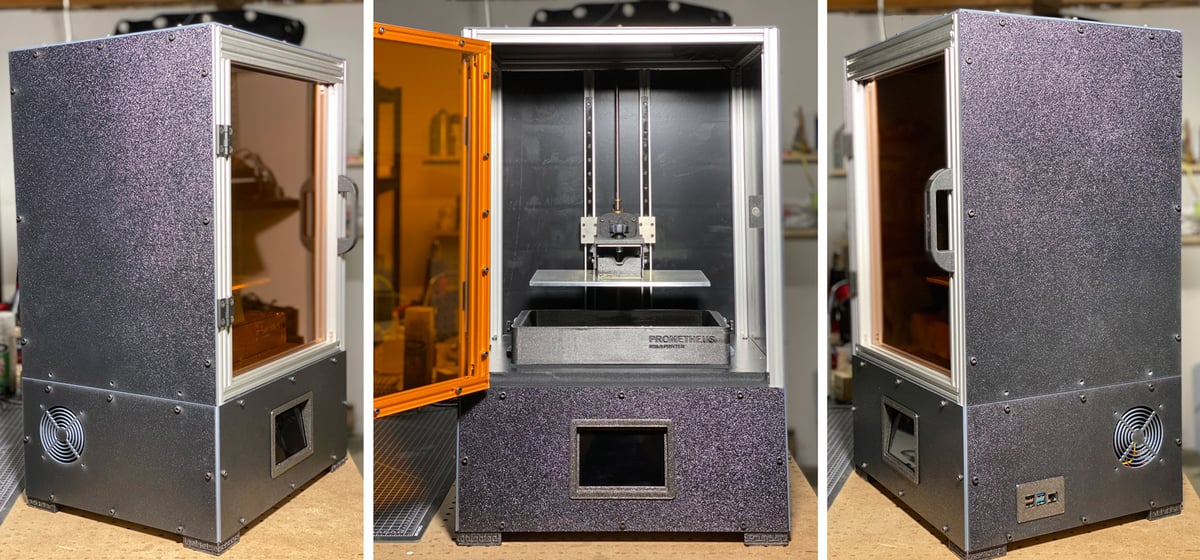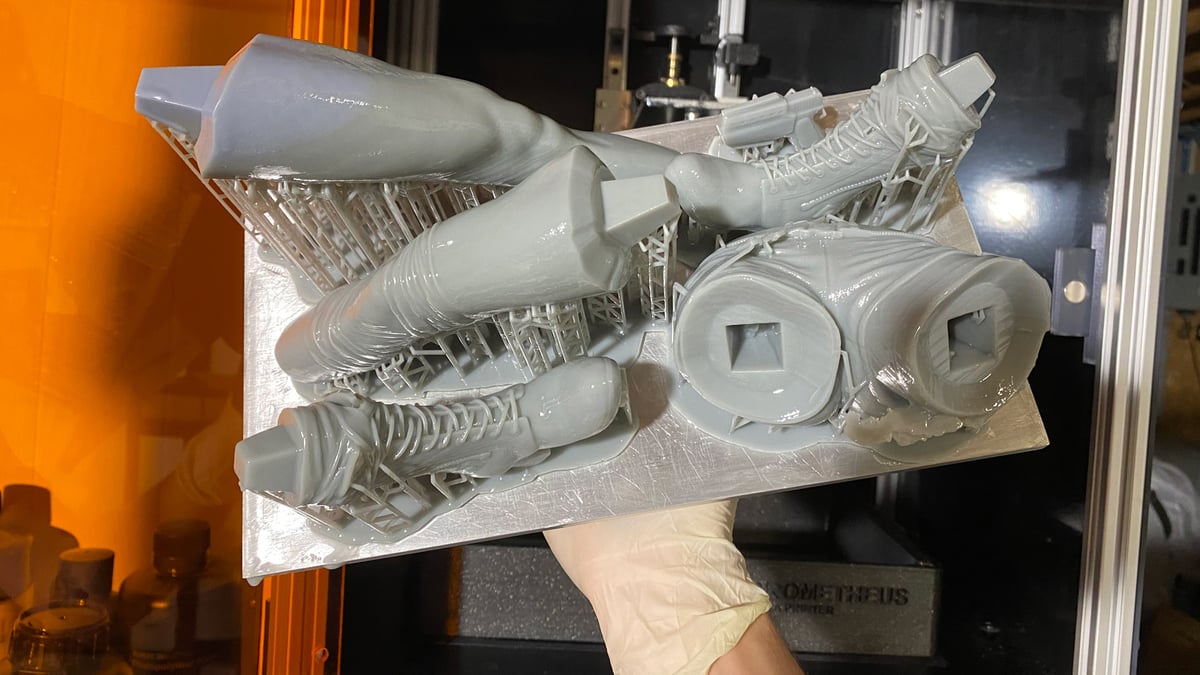Over on Kickstarter, there’s a small project out of Canada that promises something big. Huge, even; an open-source LCD-based resin printer (also known as masked stereolithography, or MSLA).
Called Prometheus, this new printer is billed as an “affordable, large-format 3D printer kit”, and it checks a few desirable boxes if its Kickstarter page is anything to go by. At first glance, it looks much like any other large-format MSLA machine, but the 3D printed components and unfamiliar UI give the first clues of the Prometheus being something a little different.
For starters, despite launching initially as a Kickstarter project with a backer reward ask of ~$1000 for the printer, maker The Contrapposto Shop plans to open-source the printer shortly after the initial delivery. Backers that pledge $20 get first dibs, though, with access to the files in April 2022, a month ahead of backers that pledge for the hardware. Public availability of the files comes later if the campaign is successfully funded (more on that below).

This means community-developed improvements will be much more than skin deep. With the design drawings, CAD files, firmware, code, and BOM accessible, anyone will be able to dig into the Prometheus’ DNA and cook up modifications for the printer, rather than hacks to improve things despite the system; they will be improvements to the machine’s core.
Scrubbing through the campaign’s video on the Kickstarter page, there’s an emphasis on affordability. In development since 2019, the Prometheus’ claim to affordability betrays this age a little. The printer compares specifications-wise to the Peopoly Phenom, undercutting said printer’s cost, but both could be considered behind the times in both resolution and LCD technology against the market of today.
Do It Yourself
Prometheus printers rewarded for backing the project on Kickstarter will come as a DIY kit, utilizing common (in other words, easy to replace or upgrade) components such as aluminum extrusions, alongside the designs for, or prefabricated 3D printed pieces such as the resin vat, housings, and other sundry parts. We’ll admit the thought of an FDM-printed resin vat doesn’t fill us with confidence – resin is not a material to be taken lightly, nor housed in potentially leaky vats. You’ll need an FDM with a 350 x 350 mm build area to comfortably produce the printed parts for the default Prometheus.
The Prometheus uses a custom mainboard designed by The Contropposto Shop. Custom, but familiar – it uses the atmega2560 microcontroller and standard pinouts. A Raspberry Pi (not provided) is necessary to run the Prometheus’ firmware, MangoOS, too. Current global shortages of single-board computers, including the Raspberry Pi, cast a big question mark over this aspect of the Prometheus. Good luck finding a Raspberry Pi today. In six months’ time? Who knows.
Skipping past Pi uncertainty, it’s worth noting that the Prometheus will use MangoOS for its firmware, and the accompanying Lychee slicer. This might just be the first printer to release with MangoOS, which even now is in closed beta. Besides giving native compatibility with the rather good Lychee slicer, this decision seems to be one in service of openness, and releasing a machine free for the user to customize as they see fit. MangoOS is slated to be open-sourced in the future, too, which could make the Prometheus an exceedingly open machine.
Alternatively, NanoDLP is a firmware option, too. Regardless of which is used, wireless control and monitoring of the printer are possible. Further still, MangoOS has the provision for time-lapse cameras and other neat tricks and conveniences that most, if not all, desktop resin printers lack out of the box.

A large, 12.5-inch RGB LCD underpins the default standard Prometheus’ printing performance, with 3840 x 2160 pixels making for a 72-micron pixel size in the X/Y across its 276 x 155 mm build area – as mentioned above, comparable to the Peopoly Phenom. Not a patch on other new machines such as Phrozen’s Sonic Mega 8K, nor will it print as fast using an RGB LCD instead of a monochrome panel. But, as we remarked in our Phenom review, this is certainly good enough for high detailed printing. It just won’t be as zippy as newer machines from established manufacturers.
The hardware places the Prometheus as a couple of years too late to be relevant, but there’s a huge caveat attached to this. The promise of the Prometheus is much greater than its printing specifications at this initial Kickstarter release, not just for users of the machine but also for the potential furtherment of desktop resin printing tech in general. If the platform is robust, it could be a freely available starting point to develop from. We have it from Contrapposto Shop co-founder Sam Boutin that the Prometheus is currently complete in V0 configuration and will step up to V1 in early 2022 with the assistance of members of its community.
The variety of backer rewards hints at the platform’s versatility already, with mono LCD-toting variants of the Prometheus being, at the time of writing, the most backed flavor of machine available.
Of course, Kickstarter campaigns being Kickstarter campaigns – unpredictable and with few guarantees – we have to say our bit. If you’re set on this initial Prometheus release, only put up money you can afford to lose – backing is no guarantee of anything landing on your doorstep a year from now.
One thing that’s not clear on the Kickstarter page is any sense of timeline for the plans and documents should the Kickstarter campaign fail. We have it from The Contrapposto Shop that a subsequent campaign would follow in this case, focusing only on funding the efforts and costs of releasing the printer’s plans – no hardware. The minimum for the plans to see the light of day appears to be a return on the time and cost of pulling the plans together.
We’ll be watching closely – the Prometheus, alongside other efforts such as the Vlare controller, firmware, and slicer, show us that the future of desktop resin 3D printing isn’t necessarily locked into a race to ever-higher pixel densities in LCDs and limited slicing options.
You can check out the Prometheus for yourself over on Kickstarter.
License: The text of "Prometheus Open Source LCD 3D Printer Hits Kickstarter" by All3DP is licensed under a Creative Commons Attribution 4.0 International License.

